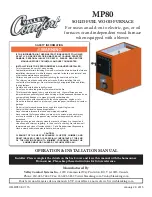
0650329-56 / 506265-03
Issue 1924
Page 5 of 13
Electrical Wiring
Turn off electric power at the fuse box or service panel
before making any electrical connections and ensure a
proper ground connection is made before connecting
line voltage. Failure to do so can result in property
damage, personal injury, or death.
WARNING
All field wiring must be done in accordance with National
Electrical Code recommendations, local codes, and
applicable requirements of UL; or in accordance with
the Canadian Electrical Code, local codes, and CSA
Standards. Power wiring, disconnecting means, and over-
current protection are to be supplied by the installer. See he
unit rating plate for unit maximum over-current protection,
minimum circuit ampacity, and operating voltage. The
power supply must be sized and protected according to
the specifications supplied. Use of multiple supply circuits
require grounding of each circuit to lug(s) provided in unit.
Use copper conductors only.
NOTE
The unit must be grounded with separate ground
connector(s). See the electrical connection diagrams
beginning on Page 12 for typical field wiring connection.
High voltage pigtail wiring connections are included in the
unit. For systems requiring additional electric heat, this
plug-in harness will be discarded and the high voltage
connection will be made on field wire points on the heater
kit. Low voltage control wiring are pigtail leads located
outside the cabinet and are color coded to match the
connection called out on the wiring schematic.
These units are designed for operation with a 208-240 volt
single phase, 60 cycle, AC power supply. The units are
internally factory wired for 240 volt installation. If 208 volt
installation is desired, it will be necessary to change the
black transformer lead in the blower cabinet control box to
the 208V terminal on the transformer.
The variable speed motor in the EFV electric furnace
contains DC filter capacitors that will cause a surge or
inrush of current when power is applied. Power is to
remain applied to the motor except during servicing.
Remove AC power before plugging or unplugging the
input power to the motor. Do not install blower relays
that interrupt line voltage to the motor.
IMPORTANT
Variable Speed Features
The EFV
electric furnace is equipped with a variable speed
motor and will deliver a constant airflow within a wide range
of external static pressures. The variable speed blower
offers the following comfort features:
Soft Start
When called into operation, the variable speed motor will
slowly ramp up to normal operating speed. This eliminates
the noise and discomfort that results caused by the initial
blast of air encountered with standard electric furnaces.
It can take up to 7.5 minutes to reach normal operating
speed.
Continuous Blower Operation
The comfort level of the living space can be enhanced
when using this feature by allowing continuous circulation
of air in between calls for cooling or heating. The circulation
of air occurs at 50% of the normal airflow rate (350 CFM
minimum).
Reduced Airflow Operation
For situations where humidity control is a problem, the
variable speed motor can be enabled to operate at a 10%
reduction in the normal airflow rate. This can be achieved
by connecting to a standard humidity control that is
normally closed and opens on humidity rise.































